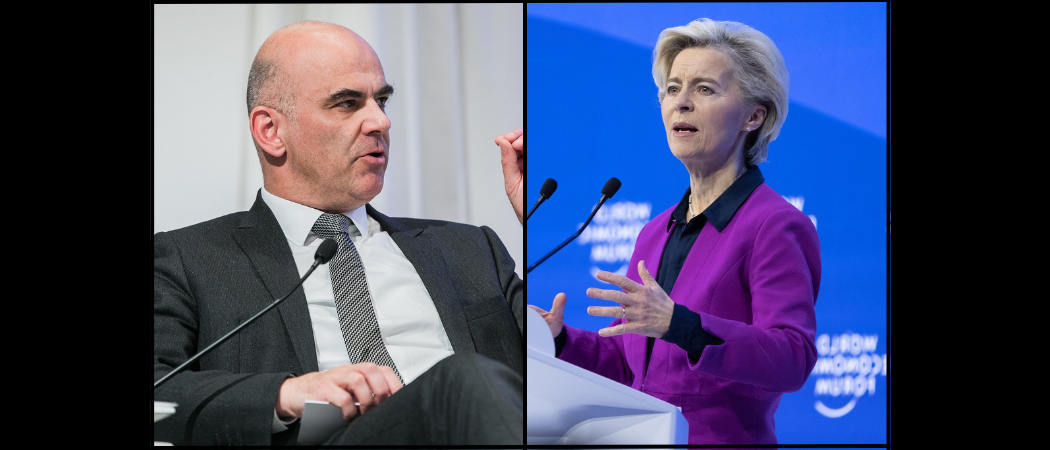There’s no sign of a breakthrough just yet, but pressure is building domestically for Bern to re-engage with Brussels in order to get association moving

Switzerland’s president Alain Berset and European Commission president Ursula von der Leyen. Photo: World Economic Forum / Flickr
Switzerland’s president Alain Berset has discussed Horizon Europe association and Erasmus+ membership with Commission president Ursula von der Leyen, as the two sides try to revive broader negotiations that could unlock talks about the research programme.
Berset, who holds the country’s rotating federal presidency this year, met von der Leyen on the side-lines of the World Economic Forum in Davos last week, where they discussed Horizon Europe and Erasmus+ membership.
“During the talks, he emphasised the values shared by Switzerland and the EU, and the common commitment to a wide range of issues that affect the continent as a whole,” according to a Swiss government statement. “A further topic was the matter of Switzerland's association to the EU’s Horizon Europe and Erasmus+ programmes.”
Because Switzerland is not associated to Horizon Europe, Swiss researchers are excluded from European Research Council grants, and have to pay their own way if they want to join consortia.
The country was also recently ejected from the European Strategy Forum on Research Infrastructures, which coordinates research infrastructure across the continent, because it is not associated.
Talks over association haven’t even begun, because Switzerland walked away from higher level negotiations in 2021 designed to agree a new overall relationship between Brussels and Bern.
But exploratory talks that aim to restart this process are continuing. On 20th January, Swiss and EU representatives sat down for a seventh round of discussions, according to a Commission spokesperson.
There are still several “structural issues” that need a “common understanding”, including alignment with EU law, the issue of state aid, and Swiss contributions to the EU’s cohesion policy.
“We have agreed that the teams will continue to engage at technical level, as we need from our Swiss counterparts a high level of precision and commitment before we can consider next steps,” the spokesperson said. The next talks are set for 7 March.
Maroš Šefčovič, the commissioner responsible for the EU’s relations with Switzerland and the UK, is to deliver a lecture on, “The relationship between the EU and Switzerland: status quo and perspectives,” at the University of Fribourg on 15 March.
Meanwhile in Switzerland, pressure is growing on the government to return to the negotiating table proper.
Last week, a majority of the Foreign Affairs Council of the country’s lower parliamentary house demanded that full negotiations begin in the first half of this year, seeing this as the only way to reach a conclusion before the current EU Commission’s term expires in October next year. Only the right populist Swiss People's Party objected.
And Swiss rectors are getting vocal about the damage Horizon exclusion is doing to Swiss science.
Michael Schaepman, Rector of the University of Zurich, told the national broadcaster SRF last week that Swiss researchers were seen as risky partners in Horizon consortia.
Yves Flückiger, rector of the University of Geneva, complained that exclusion from the EU’s quantum research calls meant a quantum start-up founded in Geneva had decided to expand in Vienna, taking with it several hundred jobs.





 A unique international forum for public research organisations and companies to connect their external engagement with strategic interests around their R&D system.
A unique international forum for public research organisations and companies to connect their external engagement with strategic interests around their R&D system.